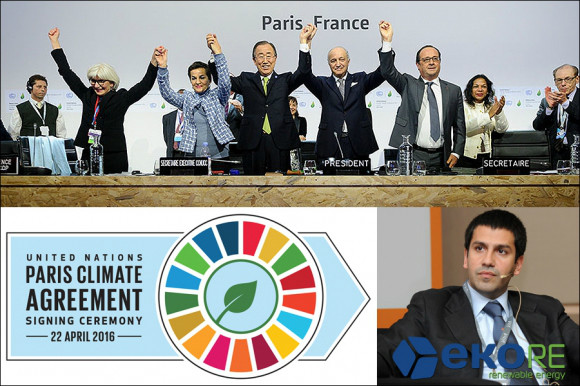The Paris Agreement Signing Ceremony
Study/English
2016. 6. 22. 14:48
On April 22, 2016, the same day as the celebration of 46th Earth Day, 175 state leaders gathered at the United Nations Hall to sign the Paris Agreement, an international treaty that aims to reduce global warming by 2020. The Paris Agreement adopted consensuson December 12, 2015. Under this agreement, countries are asked to set their own targets in helping reduce carbon emissions which they should update every five years.
The signing ceremony was convened by Ban Ki-moon, the UN Secretary-General. In his opening remarks, he said, "We are in a race against time. I urge all countries to join the agreement at the national level. Today we are signing a new covenant for the future. This covenant must amount to more than promises.”
His strong encouragements were supported by the explanation given by UN Climate Chief Christiana Figueres. She said that the involvement of the state leaders in the signing ceremony does not end with signing the document. Leaders should go back to their home countries, so they can start doing necessary ratificationprocedures of the Paris Agreement and include the treaty in their legal systems. Among the 175 nations that signed the treaty on April 22, 2016, 15 countries, mostly small islands and states, immediately ratified it.
China and the United States, two of the countries with the highest carbon emissions, intend to ratify the agreement this year. France, Mexico, Canada, and Australia plan to do the same. The European Union claims it might take a longer time because its 28 member states need to do the ratification altogether.
The participation of a big number of nations in this signing ceremony is record high in international treaties. It is also a majormilestone for the Paris Agreement because achieving 175 signatures is far more than what it needed for its implementation to begin. Out of the 195 UNFCCC participating member states that took part in the creation of the Paris Agreement, only 55 countries that produce at least 55 percent of the world's greenhouse gas emissions were needed to approve or accede to the agreement for it to be implemented.

The signing ceremony was convened by Ban Ki-moon, the UN Secretary-General. In his opening remarks, he said, "We are in a race against time. I urge all countries to join the agreement at the national level. Today we are signing a new covenant for the future. This covenant must amount to more than promises.”
His strong encouragements were supported by the explanation given by UN Climate Chief Christiana Figueres. She said that the involvement of the state leaders in the signing ceremony does not end with signing the document. Leaders should go back to their home countries, so they can start doing necessary ratificationprocedures of the Paris Agreement and include the treaty in their legal systems. Among the 175 nations that signed the treaty on April 22, 2016, 15 countries, mostly small islands and states, immediately ratified it.
China and the United States, two of the countries with the highest carbon emissions, intend to ratify the agreement this year. France, Mexico, Canada, and Australia plan to do the same. The European Union claims it might take a longer time because its 28 member states need to do the ratification altogether.
The participation of a big number of nations in this signing ceremony is record high in international treaties. It is also a majormilestone for the Paris Agreement because achieving 175 signatures is far more than what it needed for its implementation to begin. Out of the 195 UNFCCC participating member states that took part in the creation of the Paris Agreement, only 55 countries that produce at least 55 percent of the world's greenhouse gas emissions were needed to approve or accede to the agreement for it to be implemented.
The United Nations and participating nations are aware that the signing ceremony is just the beginning of a big battle against climate change. They say that achieving their ultimate goal may be quite an endeavor, but collective measures need to be done as quickly as possible for the sake of the Earth and mankind.

'Study > English' 카테고리의 다른 글
| The Two Most Powerful Women in the World (0) | 2016.06.27 |
|---|---|
| Tax Hike in the Spirit of Shared Sacrifice (0) | 2016.06.23 |
| Former Foe, Now a Friend (0) | 2016.06.21 |
| Do Slangs Corrupt the English Language? (0) | 2016.06.20 |
| The Role of Higher Education (0) | 2016.06.17 |
